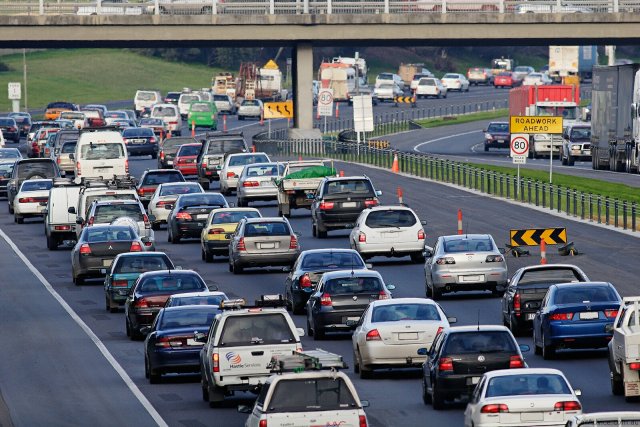
The Coalition government plans to speed up the push to privatise remaining federal and state public assets in a massive program to help fund new infrastructure projects — mainly road developments — media sources reveal.
ABC radio's AM reported on May 8 that "an infrastructure package worth about $10 billion will be at the centre of the Abbott government's first budget.
"AM understands a large portion of the money will go towards an asset recycling program, which encourages the states and territories to privatise their assets in exchange for a [15 per cent] bonus payment from the Commonwealth.
"Today, the government will announce it is giving a $2 billion concessional loan to New South Wales to fast-track the WestConnex road project in Sydney in the hope the extra money will allow construction to begin sooner. The federal government hopes that will mean the $11 billion road link ... will be completed by 2019."
Other big road projects to receive billions of dollars are expected to include the controversial East West Link in Melbourne; the South Road project in South Australia; the second range crossing in Toowoomba, Queensland; and roads and other infrastructure associated with the proposed second Sydney airport at Badgerys Creek.
In short, the Abbott government's idea of vital new national infrastructure is almost entirely limited to roads for private cars and trucks — not essential new infrastructure such as public railways, including the east coast high-speed rail proposal, which would provide a sustainable alternative to air transport and reduce greenhouse gases instead of hugely increasing them.
The national Commission of Audit report released on May 1 recommended the privatisation of a series of Commonwealth-owned public assets. The list includes: Australia Post, Snowy Hydro, Moorebank Intermodal Company, and the Australian Rail Track Corporation.
Added to the list are: Commonwealth car service Comcar, NBN Co, and the Royal Australian Mint. The Australian Submarine Corporation and Defence Housing Australia would also be sold over time.
The SMH said: "The privatisation list covers almost every government business enterprise and is sorted into three categories: Immediate; 2014-16; and beyond 2016."
Any government enterprises that operate in "contestable markets" should be privatised, the commission report said.
In other words, all the people's property, no matter how big or small, should be sold off to big business. The private equity sharks and merchant banks are no doubt licking their lips in expectation of a huge profit windfall.
Estimated major sale prices include: $3-4 billion for Australia Post; $2.2 billion for Snowy Hydro; more than $1 billion for Defence Housing; and more than $500 million for Australian Rail Track Corporation. But all these sell-offs would mean job and service cuts, and the loss of billions of dollars in payments to the public purse.
In addition to outright privatisations, the Commission of Audit recommends large-scale outsourcing of government services to business. This would include linking the privatisation of Australia Post to its taking over social security and other welfare payments.
The SMH said:"Payments of about $400 million a day to Australians from the government should be considered for outsourcing, it says. Australia Post — a privatised or soon to be privatised one, possibly — could potentially absorb payments made through 334 Centrelink centres, 126 rehabilitation centres and 139 stand-alone Medicare offices into its network of 4400 retail outlets, it adds.”
The potential disaster this poses for the community includes big job cuts in the public sector, serious individual privacy and service concerns for social welfare clients, and the danger of system failures, for a start. It would mean the destruction of a public system of social security built up over a century of struggle.
These recommendations from the Commission of Audit are a recipe for highway robbery of the public sector by big corporations.
This is an outright conflict of interest, as the commission is chaired by Tony Shepherd, former head of the Business Council of Australia, and former chairman of Transfield Services, which profits directly from government contracts, including the $1.2 billion contract to run asylum seeker detention centres on Nauru and Manus Island.
Among the many highly unpopular measures looming in the upcoming federal budget, these proposed sell-offs of public assets will be extremely controversial. Already, there is a strong union and community campaign against the privatisation of Australia Post.
The recommendation to privatise Snowy Hydro has run into a storm of criticism, including from within the Coalition itself.
Liberal MP Sharman Stone publicly criticised the proposal, telling the Guardian: “Why sell this? This is an iconic piece of infrastructure.”
The Howard government tried to sell the Snowy in 2006, but failed due to intense public opposition and a backbench revolt within the Coalition.
The Snowy Hydro scheme is jointly owned, with the federal government holding a 13% stake, the NSW state government a 58% stake, and the Victorian government 29% . Now, with Coalition governments in both states and Canberra, the push to privatise the Snowy is on again.
But such a move will undoubtedly face fierce community opposition again, including from within the Coalition parties. With all the problems facing Australia's river systems under threat of runaway climate change, privatisation of the Snowy system would certainly further contribute to uncontrolled corporate exploitation of scarce river water supplies.
These proposed all-out privatisations of remaining government-owned assets and services are an escalation of the neoliberal offensive against Australian working people and the poor. They represent blatant theft of public property, which provide community services and generate substantial income for the public purse.
All opinion polls have emphasised most people are adamantly opposed to selling public assets. The labour movement and community organisations urgently need to mobilise to fight this grand theft of public property.